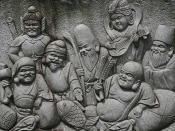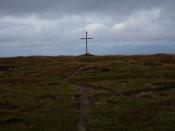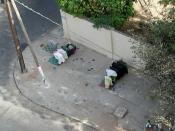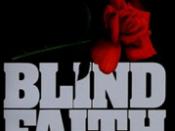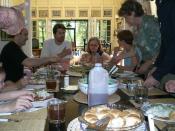In the course of reading Chapter 1 of our book, I came across something that I have known all along but taken for granted, as though it was not more important than my upcoming doctor's appointment. It is the simple yet breaking fact that I do not know what I believe in, or rather, I know what I believe, but I don't exactly know why I believe. And I am not alone in my plight. Most Filipinos, unfortunately, are guilty of this folly. We all have faith in God, not because we know the Sacred Scriptures to the letter, not because we know and live the Word. We believe because, quite simply put, we were brought up in Catholic households, and educated in Catholic schools, and what sticks to our minds is that to be a good Christian, we must have faith in God. We get too extreme about it at times and take things too literally that we miss too many points.
To be fair, our faith is "genuine", as the book also said. We truly believe in God and we all try to live as good Catholics: mass every Sunday, rosary with the family every night, we go to confession and retreats, and we pray when we wake in the morning and before going to bed. But sadly, other than those "routine" elements of being Christian, most of us do not really understand what the Bible says, or what the priests are preaching, or what really is the will of God. Neither do we involve ourselves with other people who are part of the Church. Not to mention, how we seem to think less of non-Catholics, instead of trying to share what we are all supposed to know, the Word of God. A friend told me about a conversation he had, the other person saying that non-Christians will never enter the kingdom of God. He was dead serious when he said this, which made me wonder if we, in fact, are better than the non-believers, or if we are any different at all.
I can say with a clear conscience, because I believe it to be true, that I have faith in God. What I cannot reconcile myself with, is the undeniable fact that I lack insight into what I believe in. I will not be able to go out and tell another person about how the Spirit liberates me, because even as I know this, I do not completely understand it. I will not be able to talk to a non-believer, and try to convert him into Christianity, because I know I would only be telling him "empty" truths: it would be as though I was trying to convert him by giving a summary of what it means to be a Christian. I would not be able to get to the core, to what is important.
This is because I, like most Filipinos, have never really questioned my Faith before. I mean question in a sense of trying to understand why I believe in God, and not blindly doing so. Blind faith would be pointless, like jumping off a ledge and not knowing where or if we will land. This questioning however, is not negative, as mentioned in class, it is not the same as doubting. A natural faith, as we all have, is present, and we only seek to develop and understand it, we do not set out to disprove it, and we do not start with nothing in our hearts.
So what position am I in now? I can either try to go on living my life the way I started it, or I can pay more attention to Theology class and understand what God and the Bible are really trying to tell me. I choose the latter. And if all Filipinos can find it in their hearts to be more active in their beliefs, then maybe we will not have to go on saying that Catholicism has failed to transform our society into a real Church community: true believers united in God. And what more could we want?
